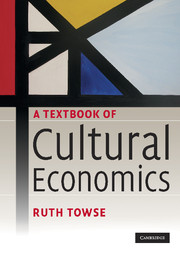Book contents
- Frontmatter
- Contents
- List of figures
- List of tables
- List of boxes
- List of abbreviations
- Preface
- Part I General issues in cultural economics
- Part II The ‘traditional’ economics of the arts and heritage
- Part III Artists' labour markets and copyright
- Part IV The creative industries
- Introduction
- 14 Economics of creative industries
- 15 Economics of the music industry
- 16 Economics of the film industry
- 17 Economics of broadcasting
- 18 Economics of book publishing
- 19 Economics of festivals, creative cities and cultural tourism
- Part V Conclusion and exercises and problems
- References
- Index
14 - Economics of creative industries
- Frontmatter
- Contents
- List of figures
- List of tables
- List of boxes
- List of abbreviations
- Preface
- Part I General issues in cultural economics
- Part II The ‘traditional’ economics of the arts and heritage
- Part III Artists' labour markets and copyright
- Part IV The creative industries
- Introduction
- 14 Economics of creative industries
- 15 Economics of the music industry
- 16 Economics of the film industry
- 17 Economics of broadcasting
- 18 Economics of book publishing
- 19 Economics of festivals, creative cities and cultural tourism
- Part V Conclusion and exercises and problems
- References
- Index
Summary
This chapter is a general introduction to the economics of the creative industries. Its purpose is to lay out a case that the creative or cultural industries can be treated, in economic terms, as a sector. In other words, what has to be shown is that there are sufficient similarities between, and common features of, a group of industries that they merit special classification and analysis. Chapters then follow on the music, film, broadcasting and book publishing industries, each containing an economic analysis of that industry, drawing upon the general points presented here, with a final chapter on festivals and locational aspects of creative industries in cities. As will become clear, these are not the only industries that are treated as creative industries but they are the ones on which there has been research in cultural economics, and they relate closely to other areas of study in cultural economics.
Structure of creative industries
The first topic in this chapter is a discussion of the ways in which creative industries have been defined and classified by international organisations and in the United Kingdom. The United Kingdom is chosen because the government officially adopted the concept of the creative industries early on and has monitored their progress over the last few years. Subsequent sections of the chapter deal with the finance and ownership patterns in the creative industries and with globalisation and international trade in cultural goods.
- Type
- Chapter
- Information
- A Textbook of Cultural Economics , pp. 375 - 404Publisher: Cambridge University PressPrint publication year: 2010



